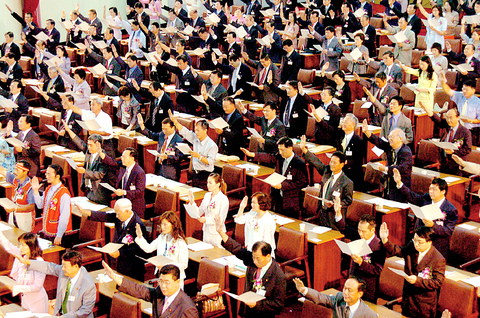On the opening day of the National Assembly yesterday, three assembly members from the Democratic Action Alliance (DAA), led by Chang Ya-chung (張亞中), resigned from their posts in protest against what they said was the "ridiculous" procedure leading to the National Assembly's formation and the body having little legitimacy.
Chang, Wang Ching-feng (
The National Assembly will not be short three members, however, as Chang said the three vacant posts will be filled by Sui Tu-ching (隋杜卿), Hsieh Ying-hua (謝瀛華) and Kuo Hung Chin-fung (郭洪金鳳), who will continue protesting while at the same time "monitoring" the meeting for the public.

PHOTO: SEAN CHAO, TAIPEI TIMES
The National Assembly, elected on May 14, is convening for the sole purpose of approving or disapproving the package put forward by the Legislative Yuan.
It is expected to pass the package as the ruling Democratic Progressive Party and Chinese Nationalist Party (KMT) together have more than 80 percent of the 300 seats, and both support the amendments.
Chang claimed that only 19 percent of the public supports the amendment package, while more than three-quarters refuse to endorse it.
This, plus the record low turnout for the May 14 elections, is a clear indication that the National Assembly is lacking legitimacy, he stressed.
Delegates to the National Assembly reported for duty yesterday at the Chungshan Hall on Yanmingshan, suburban Taipei, for their first day of work, with all 296 delegates being sworn in at 11am.
The swearing-in ceremony was presided over by Senior Presidential Adviser Yeh Chu-lan (
Chanting "oppose voting for the package, rewrite the constitution, rectify the national title and save Taiwan," the Taiwan Solidarity Union's (TSU) 21 assembly delegates were the first to collectively register.
Despite the DPP's and KMT's request for a second round of voting if any of their assembly members fail to toe the party line, TSU assembly members and the assembly's acting secretary-general Chien Lin Hui-chien (
She, however, agreed that the assembly sitting should conclude as soon as possible.
The meeting must not exceed one month, and it is scheduled to last for two weeks.
The People First Party's (PFP) 18 delegates reiterated their resolve to veto constitutional amendments.
Yeh, a member of the steering committee, said that she will respect the final decision of the steering committee for the duration of the plenary session although she hopes it would last as short as possible -- preferably three days.
"If we can finish the job in five days, we don't want to take seven, and if we can do it in one week, we don't want it to take two," she said.
KMT Spokeswoman Cheng Li-wen (
Chen Chin-jang (
In a bid to ensure its assembly members to cast affirmative ballots, Chen said that KMT Chairman Lien Chan (連戰) and Secretary-General Lin Feng-cheng (林豐正) would come to personally supervise the balloting if necessary.

INVESTIGATION: The case is the latest instance of a DPP figure being implicated in an espionage network accused of allegedly leaking information to Chinese intelligence Democratic Progressive Party (DPP) member Ho Jen-chieh (何仁傑) was detained and held incommunicado yesterday on suspicion of spying for China during his tenure as assistant to then-minister of foreign affairs Joseph Wu (吳釗燮). The Taipei District Prosecutors’ Office said Ho was implicated during its investigation into alleged spying activities by former Presidential Office consultant Wu Shang-yu (吳尚雨). Prosecutors said there is reason to believe Ho breached the National Security Act (國家安全法) by leaking classified Ministry of Foreign Affairs information to Chinese intelligence. Following interrogation, prosecutors petitioned the Taipei District Court to detain Ho, citing concerns over potential collusion or tampering of evidence. The

‘FORM OF PROTEST’: The German Institute Taipei said it was ‘shocked’ to see Nazi symbolism used in connection with political aims as it condemned the incident Sung Chien-liang (宋建樑), who led efforts to recall Democratic Progressive Party (DPP) Legislator Lee Kun-cheng (李坤城), was released on bail of NT$80,000 yesterday amid an outcry over a Nazi armband he wore to questioning the night before. Sung arrived at the New Taipei City District Prosecutors’ Office for questioning in a recall petition forgery case on Tuesday night wearing a red armband bearing a swastika, carrying a copy of Adolf Hitler’s Mein Kampf and giving a Nazi salute. Sung left the building at 1:15am without the armband and apparently covering the book with a coat. This is a serious international scandal and Chinese

Seventy percent of middle and elementary schools now conduct English classes entirely in English, the Ministry of Education said, as it encourages schools nationwide to adopt this practice Minister of Education (MOE) Cheng Ying-yao (鄭英耀) is scheduled to present a report on the government’s bilingual education policy to the Legislative Yuan’s Education and Culture Committee today. The report would outline strategies aimed at expanding access to education, reducing regional disparities and improving talent cultivation. Implementation of bilingual education policies has varied across local governments, occasionally drawing public criticism. For example, some schools have required teachers of non-English subjects to pass English proficiency

TRADE: The premier pledged safeguards on ‘Made in Taiwan’ labeling, anti-dumping measures and stricter export controls to strengthen its position in trade talks Products labeled “made in Taiwan” must be genuinely made in Taiwan, Premier Cho Jung-tai (卓榮泰) said yesterday, vowing to enforce strict safeguards against “origin laundering” and initiate anti-dumping investigations to prevent China dumping its products in Taiwan. Cho made the remarks in a discussion session with representatives from industries in Kaohsiung. In response to the US government’s recent announcement of “reciprocal” tariffs on its trading partners, President William Lai (賴清德) and Cho last week began a series of consultations with industry leaders nationwide to gather feedback and address concerns. Taiwanese and US officials held a videoconference on Friday evening to discuss the